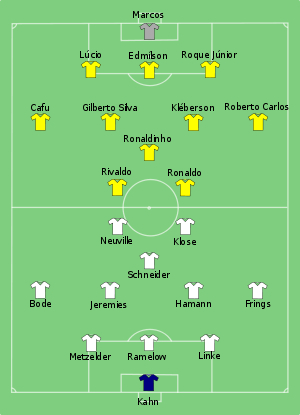
The 2002 FIFA World Cup, also branded as Korea Japan 2002, was the 17th FIFA World Cup, the quadrennial football world championship for men's national teams organized by FIFA. It was held from 31 May to 30 June 2002 at sites in South Korea and Japan, with its final match hosted by Japan at International Stadium in Yokohama. During the opening ceremony, the championship was declared opened by President of South Korea Kim Dae-jung.

Ronaldo Luís Nazário de Lima, known as Ronaldo or Ronaldo Nazário, is a Brazilian former professional footballer who played as a striker. He is the owner of Brasileiro Série A club Cruzeiro and owner and president of Segunda Division club Real Valladolid. Nicknamed O Fenômeno and R9, he is considered one of the greatest players of all time. As a multi-functional striker who brought a new dimension to the position, Ronaldo has been an influence for a generation of strikers that have followed. His individual accolades include being named FIFA World Player of the Year three times and winning two Ballon d'Or awards.

The Brazil national football team, nicknamed Seleção Canarinha, represents Brazil in men's international football and is administered by the Brazilian Football Confederation (CBF), the governing body for football in Brazil. They have been a member of FIFA since 1923 and a member of CONMEBOL since 1916.

The Germany national football team represents Germany in men's international football and played its first match in 1908. The team is governed by the German Football Association, founded in 1900. Between 1949 and 1990, separate German national teams were recognised by FIFA due to Allied occupation and division: the DFB's team representing the Federal Republic of Germany, the Saarland team representing the Saar Protectorate (1950–1956) and the East Germany team representing the German Democratic Republic (1952–1990). The latter two were absorbed along with their records; the present team represents the reunified Federal Republic. The official name and code "Germany FR (FRG)" was shortened to "Germany (GER)" following reunification in 1990.
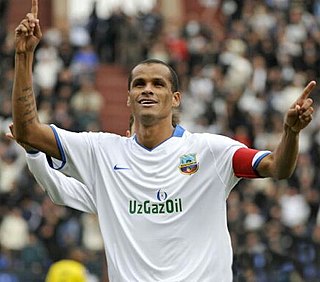
Rivaldo Vítor Borba Ferreira, known simply as Rivaldo, is a Brazilian former footballer who played mainly as an attacking midfielder but also as a second striker, and on occasion deployed as a wide midfielder or as a winger. Rivaldo is regarded as one of the greatest, most skillful, and most creative players of all time. He was renowned for his bending free kicks, bicycle kicks, feints, powerful ball striking from distance, and ability to both score and create goals. In 1999, he won the Ballon d'Or and was named FIFA World Player of the Year. In 2004, he was named by Pelé in the FIFA 100 list of the world's greatest living players. With success at club and international level, he is one of nine players to have won the FIFA World Cup, the UEFA Champions League and the Ballon d'Or.

Oliver Rolf Kahn is a German football executive and former professional player who played as a goalkeeper. He started his career in the Karlsruher SC Junior team in 1975. Twelve years later, Kahn made his debut match in the professional squad. In 1994, he was transferred to Bayern Munich for the fee of DM 4.6 million, where he played until the end of his career in 2008. His commanding presence in goal and aggressive style earned him nicknames such as Der Titan from the press and Vol-kahn-o ("volcano") from fans.
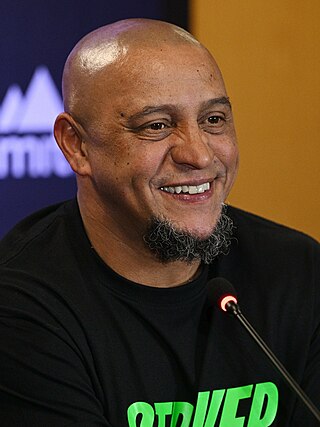
Roberto Carlos da Silva Rocha, often known as Roberto Carlos and sometimes RC3, is a Brazilian former professional footballer. He has been described as the "most offensive-minded left-back in the history of the game", and one of the greatest full-backs in history. In 1997, he was runner-up in the FIFA World Player of the Year. He is primarily known for his long career at Real Madrid and ever-presence in the Brazilian national team.

Birgit Prinz is a German former footballer, two-time FIFA Women's World Cup champion and three-time FIFA World Player of the Year. In addition to the German national team, Prinz played for 1. FFC Frankfurt in the Frauen-Bundesliga as well as the Carolina Courage in the Women's United Soccer Association (WUSA), the first professional women's league in the United States. Prinz remains one of the game's most prolific strikers and is the second FIFA Women's World Cup all-time leading scorer with 14 goals. In 2011, she announced the end of her active career. She currently works as a sport psychologist for the men's and women's teams of Bundesliga club TSG 1899 Hoffenheim.

Ronaldo de Assis Moreira, commonly known as Ronaldinho Gaúcho or simply Ronaldinho, is a Brazilian former professional footballer who played as an attacking midfielder or winger. Widely regarded as one of the greatest players of all time, he won two FIFA World Player of the Year awards and a Ballon d'Or. He is the only player ever to have won a World Cup, a Copa América, a Confederations Cup, a Champions League, a Copa Libertadores and a Ballon d'Or. A global icon of the sport, Ronaldinho was renowned for his technical skills, creativity, dribbling ability and accuracy from free-kicks, his use of tricks, feints, no-look passes and overhead kicks, as well as his ability to score and create goals, all prominent characteristics of his early-age background playing futsal. He is known by the nickname "O Bruxo".
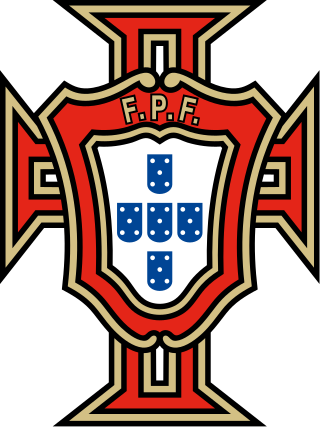
The Portugal national football team has represented Portugal in men's international football competitions since 1921. The national team is controlled by the Portuguese Football Federation (FPF), the governing body for football in Portugal. Portugal's home games are played at the Estádio Nacional stadiums in Portugal, and its primary training ground and technical headquarters, Cidade do Futebol, is located in Oeiras. The head coach of the team is Roberto Martínez, and the captain is Cristiano Ronaldo, who also holds the team records for most caps and most goals.

Romário de Souza Faria, known simply as Romário, is a Brazilian politician and former professional footballer. A prolific striker renowned for his clinical finishing, he scored over 700 goals and is one of the few players to score at least 100 goals for three clubs. He is considered one of the greatest players of all time. Romário starred for Brazil in their 1994 FIFA World Cup triumph, receiving the Golden Ball as player of the tournament. He was named FIFA World Player of the Year the same year. He came fifth in the FIFA Player of the Century internet poll in 1999, was elected to the FIFA World Cup Dream Team in 2002, and was named in the FIFA 100 list of the world's greatest living players in 2004.
At the end of each FIFA World Cup final tournament, several awards are presented to the players and teams who have distinguished themselves in various aspects of the game.
As of the 2022 FIFA World Cup, 80 national teams have competed at the finals of the FIFA World Cup. Brazil is the only team to have appeared in all 22 tournaments to date, with Germany having participated in 20, Italy and Argentina in 18 and Mexico in 17. Eight nations have won the tournament. The inaugural winners in 1930 were Uruguay; the current champions are Argentina. The most successful nation is Brazil, which has won the cup on five occasions. Five teams have appeared in FIFA World Cup finals without winning, while twelve more have appeared in the semi-finals.
On 1 September 2001 Germany met England during the qualifying stages of the 2002 World Cup, at the Olympiastadion in Munich. England won the game 5–1, helped by a hat-trick from Michael Owen. This was also the last match Germany played at the Olympiastadion in Munich.

The 1998 FIFA World Cup final was the final match of the 1998 FIFA World Cup, the 16th edition of the quadrennial football competition organised by FIFA for the men's national teams of its member associations. The match was played at the Stade de France in Paris, France, on 12 July 1998, and was contested by Brazil and France. The tournament featured France as the hosts, Brazil as the winners of the previous World Cup and 30 other teams who emerged from the qualification tournaments organised by the six FIFA confederations. The 32 teams competed in a group stage, from which 16 teams qualified for the knockout stage. En route to the final, Brazil finished first in Group A, with two wins and one defeat, after which they beat Chile in the round of 16, Denmark in the quarter-finals and the Netherlands in a penalty shoot-out in the semi-finals. France finished top of Group C with three wins, before defeating Paraguay in the round of 16, Italy in the quarter-final, and Croatia in the semi-final. The final took place in front of 75,000 supporters, with an estimated 1.3 billion watching on television, and was refereed by Said Belqola from Morocco.
At the 2002 FIFA World Cup, the knockout stage was the second and final stage of the tournament, following the group stage. The top two teams from each group advanced to the knockout stage to compete in a single-elimination tournament. A third place match was also played between the two losing semi-finalists.
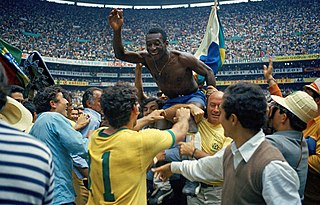
This article summarizes the results and overall performance of Brazil at the FIFA World Cup, including the qualification phase and the final phase, officially called the World Cup finals. The qualification phase, which currently takes place over the three years preceding the finals, is used to determine which teams qualify for the finals. The current format of the finals involves 32 teams competing for the title, at venues within the host nation over a period of about a month. The World Cup Final is the most widely viewed sporting event in the world, with an estimated over 1 billion people watching the 2014 tournament final.

Nine of ten members of the South American Football Confederation (CONMEBOL) have competed in the men's FIFA World Cup finals. National association football teams from CONMEBOL have won the tournament ten times, including Brazil's record five championships. CONMEBOL countries have hosted the finals five times.
The history of the Germany national football team began in 1908, when Germany played its first international match. Since then, the Germany national football team has been one of the most successful football teams, winning four World Cups and three European Championships.
The history of the Brazil national football team began with the team's first international match in 1914. Brazil played in the first FIFA World Cup in 1930. The Brazil national team has been successful throughout its history, winning the FIFA World Cup five times since 1958.



